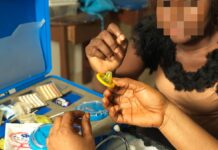Self-injury is also known as self-mutilation, self-harm, self-abuse, non-suicidal self-injury, deliberate self-harm or cutting. And it is usually done in secret; but, sometimes, it is done in groups or in public. It is usually performed in a way that leaves a pattern on the skin.
A person who self-harms can do so on any part of the body; but the parts of the body that are most commonly affected are the wrists, arms, thighs, and front of the torso.
And there are many different ways through people injure or harm themselves on purpose.
Some of the ways a person can self-harm are:
- Cutting his or her own skin with sharp object(s).
- Pulling out his/her own hair.
- Picking at wounds to stop it from healing.
- Hitting oneself (with hammer, etc).
- Punching oneself.
- Intentionally infecting his/herself.
- Puncturing his/her own skin.
- Burning his or her own skin with lit cigarettes, hot knives, irons, lit matches, etc.
- Banging or hitting one’s own head.
- Poisoning themselves with toxic chemicals.
- Scratching to the point of drawing blood.
- Breaking their own bones.
- Embedding objects beneath the skin.
- Intentionally carving the skin (with words or symbols).
- Starving his/herself intentionally (anorexia nervosa).
- Binge eating (bulimia nervosa).
- Misusing drugs and alcohol.
- Putting objects inside body openings.
- Tattooing and piercing the skin with the intention of hurting or damaging the skin are also considered self-injury.
- Exercising excessively with the intention of hurting themselves.
A person who is engaged in self-harm does not necessarily use only one of these methods listed above; he or she may use more than one of the methods of self-harm. Also, for some people, self-injury is a habit (that they do repeatedly) while for others, it is something they engaged in for a short while and then stopped.
There are a variety of reasons why different people are involved in self-injury. And there are also ways to cope and stop this practice.









